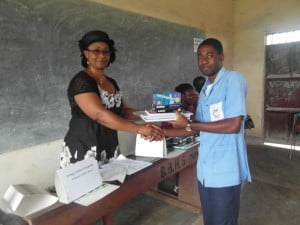44th EDITION OF WORLD EARTH DAY


The best essay came from 18-year old David Oth Malong, an Uppersixth Science student. In his essay, David explained that nowadays, the more developed our life become, the more polluted the environment is. David defined a green city as one filled with trees and whose environment is clean. He explained that if trees can be planted on the sides of the road, in central flower lands separating two traffic lanes and on roof tops as the United Nations has been urging, then green cities will become a reality. David said this will equally help to curb the effects of green house gases thus mitigating the effects of climate change.
In his essay, David equally stressed the need for a clean environment with fresh air, non-polluted water and land. He urged Cameroonians to minimize the amount of smoke released into the atmosphere if they must build a green city. He urged the use of bicycles, trekking as means of transportation as opposed to the use of old cars and automobiles which emit toxic smoke into the atmosphere. He equally urged the use of clean energy such as solar energy, wind energy in both manufacturing and daily life.
His runner up, Asah Brandon in a dramatic fashion painted a picture of a gloomy city whose inhabitants have brought down all trees. “We have cut down all the trees and built houses, we have bought beautiful cars. But one question remains; where do all these take us to? We are driving to our own doom. Our beautiful cars emit poisonous carbon dioxide into the atmosphere. Refuse from our modern houses grow into foul smelling mountains in our streets” Asah Brandon in his essay urged the government to think green by enacting laws that will facilitate the realization of a green city such as mapping out every town and creating drainage systems to avoid the occurrence of floods. He also called for the establishment of more recreational facilities such as the botanical garden.
On her part, the third winner, 16-year-old Lower sixth Arts student, Ngweni Betina argued that a green city is one not just filled with trees and a clean environment but with healthy people because as she puts it “Show me a healthy environment and I show you healthy people”. She urged people to reduce electricity consumption. She equally cried foul on the pollution of streams with garbage and called for a better management of waste in order to build green cities.
Reacting to his victory, the Best essay winner, David Malong said he feels proud emerging first “It is such an honour for me to have come out first in this competition out of over 15 students who participated from 3 different schools. I will share the victory with my peers and also educate them about how they can contribute in building green cities”
On his part, the second winner, Asah Brandon from Charity Comprehensive College, Mile 16 said emerging second made him proud given that it is his second consecutive win “Last year I won a prize about Climate change
By Regina Leke



